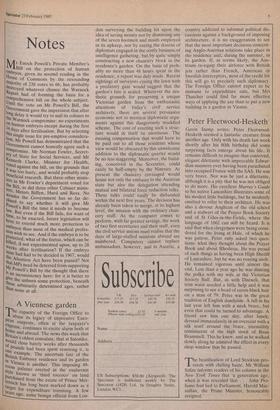Notes
Mr Enoch Powell's Private Member's Bill on the protection of human entbryos, given its second reading in the Huse of Commons by the resounding Majority of 238 votes to 66, has probably destroyed whatever chance the Warnock Report had of forming the basis for a comprehensive bill on the whole subject. „"itil the vote on Mr Powell's Bill, the wwernment gave the impression that after 1°4 delay it would try to nail its colours to the Warnock compromise: no experiments °n human embryos except during the first 14. days after fertilisation. But by selecting this single issue for pre-emptive considera- tion, Mr Powell has demonstrated that the Government cannot honestly agree such a compromise. Mr Norman Fowler, Secret- ary of State for Social Services, and Mr Kenneth Clarke, Minister for Health, voted against the bill, on the grounds that beneficial was too hasty, and would probably stop neneficial research. But three other minis- ters in Mr Fowler's department voted for the Bill, as did three other Cabinet minis- ters, Messrs Biffen, Hurd and Rees. No WOnder the ' Government has so far de- clined to say whether it will give Mr OWell's Bill the time it needs to become r. But even if the Bill fails, for want of hIav nt e, to be enacted, future legislation will e to extend much more protection to e!nhryos than most of the medical profes- sion wish to see. And if the embryo is to be protected, what of the foetus, which can be killed, if not experimented upon, up to 28 Weeks after fertilisation? If the embryo issue had had to be decided in 1967, would the Abortion Act have been passed? Not that MPs need be deterred from supporting Mr Powell's Bill by the thought that there is an inconsistency here: for it is better to Pve the unborn some protection, beneath these arbitrarily determined ages, rather than none at all.










































 Previous page
Previous page